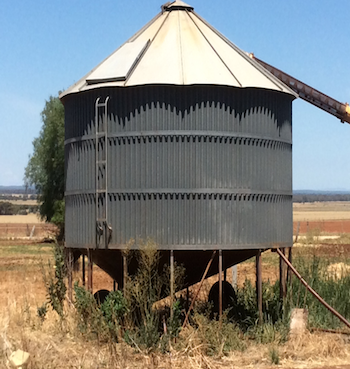In partnership with Plant Health Australia (PHA), Agriculture Victoria is increasing surveillance efforts for the exotic pest Khapra beetle in grain storage sites by expanding its Sentinel Silo Surveillance Program.
Australia already has sentinel beehives, sentinel chicken flocks and other sentinel plant and animal surveillance programs.
Under the PHA-funded Grains Farm Biosecurity Program (GFBP), Agriculture Victoria plans to recruit more grain storage sites around the state to act as sentinel sites. The move will tie in with national efforts and expand exotic pest surveillance coverage in the Australian grains industry.
Sentinel surveillance sites are early indicators of a new pest or disease incursion and enable rapid eradication, preserving market access and avoiding expensive and time-consuming management issues.
 Any type of grain storage equipment is suitable for Khapra beetle surveillance. Photo: Plant Health Australia
Any type of grain storage equipment is suitable for Khapra beetle surveillance. Photo: Plant Health Australia
Khapra beetle is a highly invasive insect that is not present in Australia. It poses a major threat to Australia’s agricultural production, biosecurity and the environment. If the pest became established in Australia, it would seriously affect the trade and export of produce, causing huge economic losses.
Khapra beetle can infest more than 100 commodities including wheat, maize, barley, rice, millet, sorghum, pulses, cotton, sunflower, sesame and spice seeds, and some animal products. It can be found in stored products and around places where products have been stored or transported, including between cracks and under floors of storage and shipping containers and packaging material.
Victoria has 75 surveillance traps deployed at a range of sites including grain farms, dairy farms, piggeries, feedlots, grain bulk handlers, stockfeed suppliers and at seaports across the state.
Whether on-farm grain is stored in a bin, bunker, shed or silo, Agriculture Victoria would appreciate farmers’ participation in this important program. Not knowing what is present in grain storage facilities across the state is a big concern.
With grain moving between ports for export, around the country for feed, and transporters moving all kinds of freight across the country, it is vital to have representative sentinel sites in all districts.
By checking the small dome traps at sentinel silos every three months, Agriculture Victoria will be able to report with greater certainty that Khapra beetle is absent from grain stores in the state.
In addition, grain can be sieved for other storage insects and these can be tested for phosphine resistance, which poses another threat to the integrity of grain storage systems.
The location of all sites will be kept confidential and participating farmers will be doing Australian agriculture and the grains industry a huge service.
This initiative is part of the GFBP, which is a collaboration between Agriculture Victoria, PHA and Grain Producers Australia (GPA). The GFBP is an initiative to improve the management of and preparedness for biosecurity risks in the grains industry at the farm and industry levels.
The GFBP website offers practical resources for farmers such as fact sheets, videos, how-to guides, online training and strategies to assist in managing grain farm biosecurity risks.
To express interest in hosting the small dome traps or to receive a free print copy of the Monitoring Stored Grain on Farm booklet, please contact Jim Moran on 0418 377 930 or email Jim.Moran@agriculture.vic.gov.au.
More information: Grains Farm Biosecurity Program website

























































